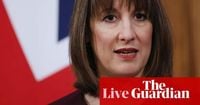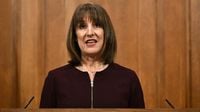Chancellor Rachel Reeves has laid out her plans for the UK economy in her Spring Statement, asserting that she remains on track to meet her self-imposed fiscal rules, which she has described as "non-negotiable." However, skepticism looms over whether she can maintain this trajectory without resorting to tax increases, as economic uncertainties mount.
In October 2024, the Office for Budget Responsibility (OBR) projected that Reeves would have £9.9 billion in fiscal headroom to work with. But as of March 27, 2025, that same figure remains unchanged, raising eyebrows about the sustainability of her fiscal strategy. Richard Hughes, the OBR chairman, noted that numerous factors could "wipe out" this headroom, including escalating trade tensions and rising interest rates.
Among the most immediate threats is the recent announcement by US President Donald Trump, who has imposed a 25% tariff on cars and car parts imported into the United States. According to the OBR, these tariffs could directly impact goods totaling around 0.2% of the UK's GDP. In a worst-case scenario, the OBR warns that economic growth could be reduced by as much as 1%. This uncertainty could hinder spending by businesses and households alike.
Reeves acknowledged the potential negative impact of these tariffs on the UK economy but emphasized that the government is engaged in "extensive" discussions to mitigate their effects. The chancellor faces pressure to stabilize the economy while balancing her commitment to fiscal discipline.
The Spring Statement also unveiled significant cuts to the welfare budget, which have drawn criticism from various quarters. Paul Johnson, director of the Institute for Fiscal Studies (IFS), indicated that there is a good chance Reeves may have to raise taxes in the autumn if economic forecasts worsen. He warned that speculation about potential tax hikes could be economically damaging in itself.
Stella Creasy, a Labour MP, has publicly condemned the welfare cuts, arguing that they are "counterproductive to getting the economy moving." She highlighted that the timing of these cuts is particularly troubling, given that 4.5 million families are already living in poverty. Creasy stressed the need for alternative strategies that would not exacerbate poverty while still addressing economic challenges.
Meanwhile, Labour leader Sir Keir Starmer has expressed concern over the import tariffs, labeling them "very concerning" but affirming that the UK will not engage in a trade war with the US. Starmer has refrained from committing to future tax increases but noted that the government's recent budget decisions reflect a mindset against raising taxes for ordinary citizens.
As speculation mounts about potential tax increases, the economic landscape appears increasingly precarious. Analysts predict that if the chancellor's fiscal headroom diminishes, the only options left would be further cuts to public spending or raising taxes. The government has already announced substantial reductions in welfare spending, including cuts to sickness and disability benefits, which have sparked backlash from both the public and within the Labour Party itself.
Simon Opher, a Labour MP from Stroud, has indicated his intention to vote against the welfare reforms, reflecting a growing dissent among backbenchers. The backlash extends beyond party lines, with many stakeholders expressing concern over the potential social ramifications of these cuts.
Adding to the complexity of the situation is the ongoing crisis in the UK steel industry, with British Steel consulting on the potential closure of blast furnaces at its Scunthorpe site. This development has raised fears of significant job losses, further complicating the economic landscape.
In light of these challenges, the chancellor's commitment to fiscal discipline faces intense scrutiny. Critics argue that her rigid adherence to fiscal rules may undermine sensible policymaking, particularly in a volatile economic environment. Paul Johnson from the IFS emphasized that having little fiscal headroom while rigidly applying fiscal rules could create instability.
The situation is compounded by the fact that lower-income households are projected to become £500 a year poorer over the next five years due to the chancellor's welfare reforms. The Resolution Foundation has warned that the cuts will disproportionately affect those already facing economic hardship.
As the government navigates these turbulent waters, the prospect of rising taxes looms large. Reeves has stated that it would be "grossly irresponsible" to rule out future tax increases, acknowledging the delicate balance she must maintain to reassure financial markets while addressing the needs of the populace.
Moreover, the chancellor's recent remarks regarding the necessity of maintaining fiscal headroom have raised eyebrows. Critics have pointed out that her fixation on maintaining the same fiscal figure as in previous budgets may not align with the realities of the current economic landscape.
As discussions continue regarding the implications of Trump's tariffs, Reeves has reiterated that the UK will seek exemptions to protect its automotive sector. She emphasized that trade relations between the UK and the US are crucial, with one million British workers employed by American firms and vice versa.
In conclusion, the upcoming months will be pivotal for Chancellor Rachel Reeves as she grapples with the dual pressures of maintaining fiscal discipline while responding to an increasingly uncertain economic environment. The decisions made in the near future will not only shape the UK’s financial landscape but will also have lasting implications for millions of families across the country.






